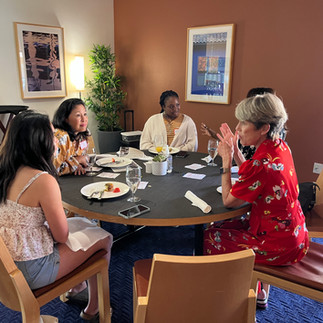Spring Brunch 2023
- stanfordcapandgown
- May 24, 2023
- 6 min read
Be an Agent of Change!
Dr. Sara Jordan-Bloch on How We Can Be Agents of Change
By Alicia Purpur, ‘23, Cap and Gown Co-President and Ellen Petrill, ‘77, MS ‘78 Cap and Gown Alumni Board
Our Brunch’s Setting
The blooming flowers, chirping birds, and the sweet scent of spring are upon us. Spring is a beautiful season to connect with new and existing friends at Cap and Gown’s annual Spring Brunch. This year, more than 30 women leaders gathered in Vidalakis Dining on April 23, 2023 to enjoy a variety of sweet and savory dishes and refreshing drinks while engaging in meaningful conversations that prompt us to reflect on the past and anticipate the future with great excitement. Spring Brunch, most importantly, is an opportunity to learn from others and gain insights into different experiences.
Our Speaker, Dr. Sara Jordan-Bloch

This year, our Cap and Gown community had the privilege of hearing from sociologist Sara Jordan-Bloch, who shared her story through anecdotes and advice. She holds a B.A. in Sociology from Brown and a Ph.D in Sociology from Stanford. Her career as a sociologist has showcased uncompromising attention to women’s equality and diversity, equity, and inclusion (DEI). At Spring Brunch, Dr. Jordan-Bloch spoke to us about her experiences living in different cultures and working with different people and how they shaped her perspectives on social norms, status, power, and belonging, making her a tireless advocate for others.
After growing up in Tennessee with time living in India, Switzerland, and France thanks to family experiences abroad, Dr. Jordan-Bloch attended Brown University. Here she found her passion for sociology. After graduating and some time away from academics, she chose Stanford for her PhD program due to the academic freedom Stanford afforded. Here she discovered her passion: research for social change.
Dr. Jordan-Bloch’s current work focuses on addressing gender inequality and supporting young women as they navigate critical transitions in their careers. Her project, Seeds of Change, highlights the importance of learning in community and the power of addressing feelings of inequality.
Dr. Jordan-Bloch shared some valuable advice:
Pay attention to your feelings. Bias can manifest not only in patterns of behavior but also in how we feel the impacts of these behaviors. Your feelings of not belonging could mean that you are in a system or setting where you are not being valued, usually due to stereotypes, not because you are personally falling short. When you are in a system or setting where you are constantly being undermined and have to prove yourself over and over again, it’s only natural to start to second-guess yourself. Notice whether others (or groups of others) are being interrupted or not listened to and whether they feel the way you do too.
Don’t have a fixed mindset about having a growth mindset. Ask yourself, am I really open to learning? You may assume you have a growth mindset but in light of setbacks and messy situations, you may not be as open as you want to be. Notice, be open, and don’t expect perfection. Be up for learning and growing. This is hard - especially when we’ve been held to very high standards and feel extra scrutinized - but easier when we can lean on each other for support and create learning communities together.
Ask yourself: Do things have to be this way? It is essential to ask ourselves whether we are satisfied with the current state of things or whether we can do something to improve the situation. Consider what changes you can drive or contribute to and take action. Asking “do things have to be this way” reveals that very little in life is absolute or fixed and that we can, and should, question many of the dynamics, systems, and structures we take for granted – especially when they leave us feeling undervalued or disempowered.
Q&A
The Q&A portion of Dr. Jordan-Bloch’s talk was an enriching and deep discussion among attendees. Women shared their candid life experiences, expressed frustrations regarding enduring inequality, and uplifted one another with encouragement. Intersectionality, namely the unique experience of women of color, was of supreme importance in our discussion. Alumni chimed in saying they were exhausted after up to fifty years of fighting for change and not reaching satisfactory progress. Dr. Jordan-Bloch concurred, saying that while some movement toward racial and gender equality has been attained, we must be radical to transform our world. Through answering questions and engaging with the audience, Dr. Jordan-Bloch touched on topics not covered in her prepared remarks. Below is a summary of the discussion:
1. Do you raise your son differently than your daughter?
Dr. Jordan-Bloch actively recognized that the gender of her children is to be determined by them as they get older, and that she is open and accepting of whatever gender identity and expression suits them. She then noted that raising a child in our heavily gendered society requires effort to stop gendered messages from being reinforced. She talked about how early stereotypes take hold and shared a research study where pregnant women who knew they were having a boy were more likely to characterize their unborn child's kicks as “masculine” (e.g. strong and powerful) than women who knew it was a girl or did not know the sex.. The audience gasped at this fact, recognizing it as a reflection of gendered assumptions.
2. How can we deal with the peer-pressure to do the “perfect thing” after graduation?
Dr. Jordan-Bloch said NO, you don’t have to do the perfect thing! There is no such thing! Do not follow peer pressure! She recognized the pressure to perform perfectly and emphasized that she took a break to reset after Brown, and that the decision to do so did not “ruin” her career. She reassured seniors that even a failure in your first job does not doom your entire career, and that following the rulebook can be limiting.
She also encouraged audience members to be open to counter cultural ideas and to pay attention to life’s little moments which can guide their path.
3. How important is a mentor?
Dr. Jordan-Bloch emphasizes the need for mentors and not to limit them to a single mentor because unique relationships generate distinct forms of support. Seek relationships that are beneficial for specific aspects of your life. She reminded us, especially the younger women in the room who occupy the position of “mentee,” that we all have something to offer, and that mentorship is not a one-way street, it will be mutually beneficial.
4. What is your advice on balancing work and family as a woman?
Yes, you can have and enjoy both!. But there is more work to be done to make organizations more enabling of family life, thus more inclusive. For example, Dr. Jordan-Bloch stressed that it can be problematic when promotions and praise are related to working more hours or having more facetime, as opposed to being tied to clear performance criteria. More hours or more facetime can be proxies for better performance, which is not necessarily true. This practice can be exclusionary by design, limiting advancement for those who have family responsibilities. Dr. Jordan-Bloch also pointed out that because the effects of biases and stereotypes are so powerful, cultural transformations are necessary to change beliefs and behaviors.
5. What are your current projects?
Dr. Jordan-Bloch talked about how her colleagues at the Lab are conducting research on the future of work and conducting interviews with both leaders and employees to better understand their experiences with remote work, particularly in relation to DEI. She shared about other Lab projects on how bias can show up in organizational processes - for example how language in a job description can discourage some potential candidates to turn away from applying and how changing the language changes the applicant pool. She also mentioned work she is doing with a colleague on “demystifying the unwritten rules of work” in the early career - to help level uneven playing fields of informational advantage. In addition to her research projects, Dr. Jordan-Bloch continues to direct the Seeds of Change initiative and is leading a new branch of the project - an Educator Training Program
6. What should I look for in a new job?
Dr. Jordan-Bloch discussed the importance of a safe learning environment where failure is not punished but recognized as a growth opportunity and feedback is welcomed. She acknowledged that there is still work to be done to create such environments, but prompted us to inquire about it during interviews and know that we have the power to choose a company too, it is not just the other way around.
She encouraged the audience to apply to jobs even if they don't meet all the requirements!
In conclusion, the journey to “success” is not always a straight and narrow path nor is it a final destination. As a sociologist, Dr. Jordan-Bloch is always asking questions and seeking answers through research. She is actively seeking and enacting social change. Her valuable worldview is informed by her living abroad experiences, her adventures after college, and the challenges she faced along the way. Dr. Jordan-Bloch imparted to everyone in the audience the importance of fostering relationships with people who support you, saying yes to work experiences that are enriching and aligned with your interests, addressing feelings of inequality instead of ignoring them, and seeking mentorship. These lessons can be applied to students and alumni alike, whether one is navigating school, making a career change, or finding balance and purpose in their personal life.

_edited.png)














Thank you for this clear and informative article. The subject is explained in a straightforward way, making it easy to understand. Content like this is helpful when learning about how digital media platforms are evolving.
togel 4d
Truly inspiring reflections on leadership, learning, and being an agent of change
Dr. Sara Jordan-Bloch’s insights on questioning systems, embracing growth, and creating inclusive environments resonate far beyond academia. Change happens when people feel valued, supported, and empowered to learn together.
At Restrory Restaurant Management System, we believe the same principles apply in workplaces everywhere, including restaurants, where fair systems, clear performance measures, and supportive cultures help people thrive. Thank you for sharing such a meaningful conversation.
Mình có lần lướt đọc mấy trao đổi trên mạng thì thấy có người nhắc tới dapodik trong lúc câu chuyện đang nói dở, nên cũng mở ra xem thử cho biết. Mình không tìm hiểu sâu, chỉ xem qua trong thời gian ngắn để nhìn bố cục và cách sắp xếp nội dung tổng thể, đọc lướt cũng không bị rối. slot gacor Xem như vậy xong mình quay lại đọc tiếp các bình luận khác.
Spring Brunch 2023 sounds like the perfect way to enjoy fresh flavors, sunshine, and good company. Events like this bring friends and family together to celebrate the season. Adding a playful flair with a ricky bobby costume can make the brunch even more fun and memorable.
Ditemukan Seorang Pria Tak Dikenal Tewas Gantung Diri